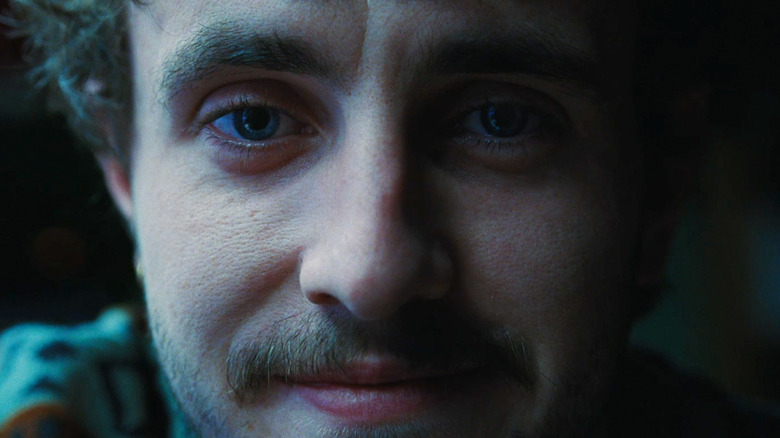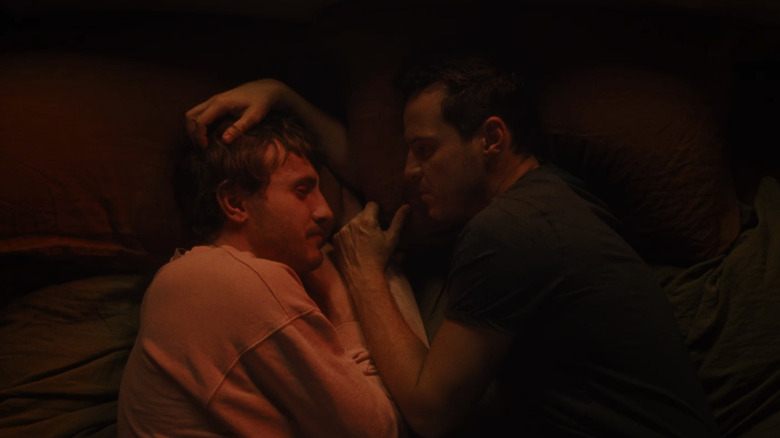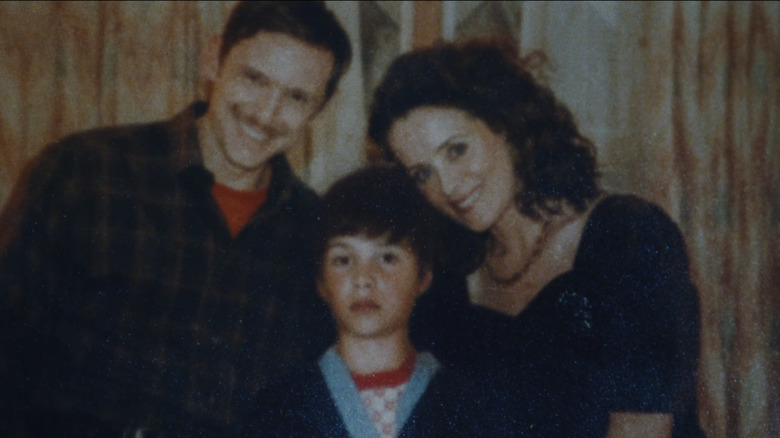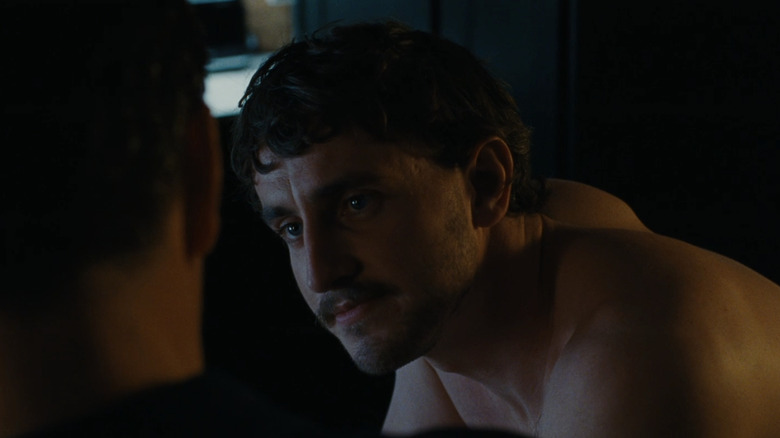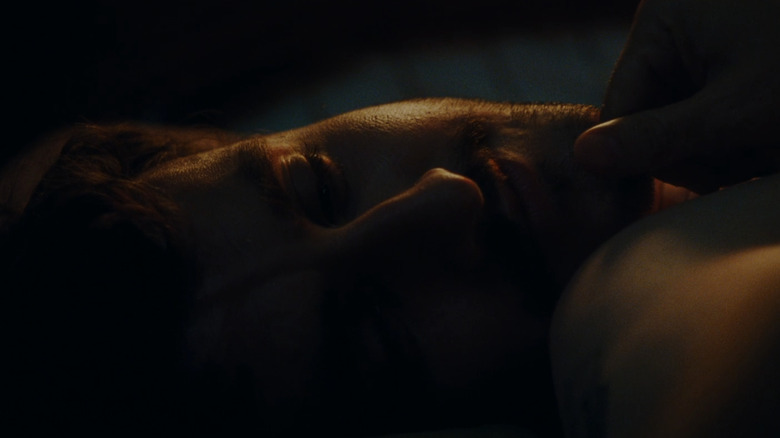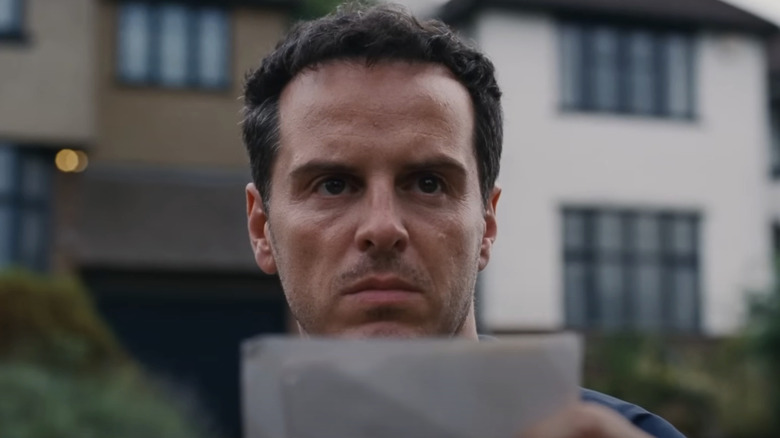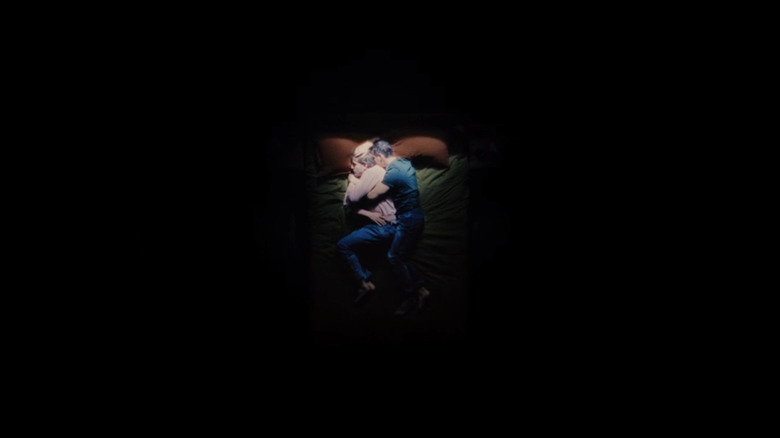All Of Us Strangers Ending Explained: The Power Of Love
This post contains major spoilers for "All of Us Strangers."
As Hollywood continues to capitalize on our nostalgia-obsessed monoculture with "Harry Potter" reboot shows and superhero movies stuffed with cameos from erstwhile stars, a series of much more thoughtful films have been quietly probing the darker side of nostalgia. Charlotte Wells quietly broke hearts in 2022 with "Aftersun," a film that gilds its elegy for lost innocence with the unmistakable textures of a '90s childhood. Then, with its unique aesthetic, "Skinamarink" upended the very concept of nostalgia, creating a haunting tapestry of childhood images shot in the director's own childhood home. That same year, another film shot in the house where its director grew up continued this trend of examining the dark underbelly of nostalgia.
"All of Us Strangers" was written and directed by Andrew Haigh, who loosely based the story on the 1987 novel "Strangers" by Japanese writer Taichi Yamada. Haigh took very little from the original book, instead telling a deeply personal story of a queer man completely isolated from society who embarks on a journey through the past in order to reckon with the unresolved trauma of losing his parents at a young age.
The film deals with themes of grief, loneliness, longing, and love, weaving a lyrical, oneiric narrative that, like the childhood memories of its protagonist, lingers in the mind long after one experiences it for the first time. But it's not just the emotional resonance of the movie that lingers. "All of Us Strangers" has its share of twists, leaving audiences with questions about how the story fits together. With that in mind, here is a full explainer for the ending of "All of Us Strangers."
How Does All of Us Strangers End?
When "All of Us Strangers" begins, Adam ("Ripley" star Andrew Scott) is a 30-something writer living alone in a London high-rise. He is seemingly the only individual in his apartment block, until one evening another resident, Harry (Paul Mescal), knocks on his door, a bottle of whiskey in-hand, and asks to come in. Clearly uncomfortable, Adam declines the offer, and Harry leaves.
As the film progresses, we learn that Adam's parents were killed in a car accident when he was just 12 years old. The writer then visits his childhood home outside London, where he sees what we assume are hallucinations of his parents at the same age they were when they died. We follow Adam as he continually journeys back to his old house, meeting his parents and grappling with issues that were never addressed during their lifetime — most significantly the fact that Adam is gay.
All the while he's confronting his trauma through these hallucinatory therapy sessions, Adam builds a relationship with Harry, with whom he ultimately falls in love. The pair become very close, bonding over their shared sense of being outsiders and their ongoing loneliness. After a scene that sees Adam and his parents visit a favorite childhood restaurant, the writer seems to gain some sense of closure before returning to his tower block in search of Harry. But once he arrives in Harry's apartment, he finds his lover's body laying alone in bed, having seemingly been dead for some time.
Adam then finds a living version of Harry — another of his hallucinations — in the living room, and the two embrace. The film cuts to the pair laying in bed. Harry asks Adam to put a record on, and he chooses "The Power of Love" by Frankie Goes to Hollywood. As the camera pulls out on the image of the couple in bed, they fade into a bright light which then becomes another star among others in the night sky.
Were Adam's parents real in All of Us Strangers?
Not only does the dream-like cinematography of "All of Us Strangers" maximize the film's emotional wallops, but also the story itself has a kind of hypnogogic feel to it. Early on we learn that Adam's mother and father, played by Jamie Bell and Claire Foy respectively, died in a car crash, and yet they're waiting for him every time he makes the trip back to his childhood home.
Put simply, these versions of Adam's parents are his own hallucinations. At the beginning of the film, we learn that the writer is working on a screenplay about his childhood, typing "EXT SUBURBAN HOUSE 1987" on a blank page. One interpretation of Adam's frequent trips home and his visions of his parents is as a visualization of his own writing methodology. His psychological trips back in time while writing the screenplay are rendered as actual physical journeys to his childhood home, where his parents still live in exactly the same form as Adam remembers them.
Another interpretation is that Adam really does make the physical trips to his childhood home, but is hallucinating all the interactions with his parents. Considering his first trip depicts the house as it would be in the present day, this seems like a much more likely explanation. Either way, Adam's parents are not "real" in the sense that they have physically been resurrected. They're not even really ghosts in the traditional sense. They are figments of Adam's mind, only real in the sense that they were, at one time, alive. In "All of Us Strangers," however, Adam's mother and father are hallucinatory manifestations of Adam's own memories — conjured so as to provide their son with a way of processing their passing.
Was Harry real in All of Us Strangers?
The inescapably tragic climax of "All of Us Strangers" comes when Adam discovers Harry's body in bed. This shocking reveal confirms that Adam and Harry's entire love affair has also been a hallucination, with Adam imagining the entire thing just as he had imagined his interactions with his deceased parents. After finding the body, Adam converses with his hallucination of Harry (giving Paul Mescal an opportunity to remind us all of how spectacular he was in his Hulu miniseries "Normal People") who asks "How come no one found me?" This, coupled with the fact that Adam recoiled from the smell when he first entered the apartment, confirms that Harry had been dead for some time — more on that later. Adam then tells him, "I'm sorry. I was too scared to let you in," referring to both the night that Harry knocked on his door and his own inability to let anyone past his emotional barriers.
But just because the relationship itself was a fantasy playing out in Adam's mind, that doesn't mean Harry was never real. In fact, Harry is likely the only main character in "All of Us Strangers" other than Adam who starts off the film as a real, living person. What's more, the fact that Harry and Adam's relationship wasn't "real" is less important than the fact Adam clearly still harbors a desire for connection and ultimately love, which he played out through his hallucinated love affair with Harry. In that way, Harry acted as a way for Adam to remind himself of, to use Frankie Goes to Hollywood parlance, "the power of love." Despite cutting himself off from the world and living in self-imposed exile from society, his hallucinated relationship with Harry is proof that the desire for human connection still resides within Adam. While Harry's death is incredibly sad, then, it also has an incongruously uplifting aspect.
When did Harry die in All of Strangers?
When Adam first discovers Harry's body in his apartment, we're shown a glimpse of Harry lying in the same clothes he wore the very first night he knocked on Adam's door with his bottle of whiskey. This suggests that Harry died that same night. This is then confirmed when Adam picks up that same whiskey bottle which has been completely drained, suggesting Harry drank the entire thing himself and died shortly thereafter.
As such, the film seemingly confirms that Harry was very much a real person living in the same building as Adam, but every interaction after that initial meeting at Adam's door has been another of his hallucinations. The conversation between the two following the discovery of Harry's body all centers around how lonely and scared Harry was the night he knocked on Adam's door, and Adam's compunction over turning him away is all the further proof that Harry passed away almost immediately after that very first interaction.
What have the director and cast said about the ending of All of Us Strangers?
In a behind-the-scenes special, writer/director Andrew Haigh spoke about how he wanted to provoke certain feelings that stayed with audiences after "All of Us Strangers" ended — much like Christopher Nolan with his pitch dark ending to "Oppenheimer." "I want people to leave the cinema and think about their own relationships," he said. "Both as a parent, as a child, as a partner, as a friend, whatever that might be, and how this film might reflect on their lives." In that sense, while the film is ultimately rooted in the queer experience, it tackles universal themes of loneliness, grief, and human connection, and is designed to make audiences reflect on their own lives with these themes in mind.
Haigh also spoke to Time about the end of the film, stating that the finale is "basically saying that what is important in life is love in whatever way you manage to find that, whether it's in a relationship, whether it's with your parents, whether it's with a friend." Elsewhere in the interview, Haigh explained his view that "Life is about dealing with loss. But the love that comes from that is the essential, important thing." This is summed up by the use of "The Power of Love" in those final moments of "All of Us Strangers."
Star Andrew Scott also noted the use of this song, telling The Guardian, "I find the ending of the film incredibly beautiful. 'The Power of Love' plays over the end of the film, and to me, it's incredibly hopeful. It's this love story between these two men that takes its place among the stars."
What does the ending of All of Us Strangers mean?
Though it is full of tragedy, clearly Andrew Haigh and Andrew Scott see "All of Us Strangers" as a hopeful film. The ending is the most obvious example of that, with Adam and Harry becoming immortalized in the stars, their love as enduring as the cosmos itself.
But beyond Adam finding the capacity for love within himself, the film's title also reveals a lot about the underlying hope that drives this otherwise tragic tale. Rather than re-use the name of the novel on which the film is based, Andrew Haigh adds an extra three words at the beginning: "All of Us." In so doing, he seems to be pointing to the fact that we're all capable of experiencing loneliness and grief. We're all capable of feeling like outsiders, caught up in our own feelings or experiences. All of us, at some point in our lives, feel like strangers. But in our shared experience of life's hardships, none of us are truly strangers at all, and ultimately we're all capable of embracing love as a way of cutting through the illusion of distance between us.
For all the complexity of its themes — grief, loneliness, nostalgia — "All of Us Strangers" has a simple message at its core about embracing love as a way of bringing us closer, and the ending of the film is the most heartfelt testament to that idea.
